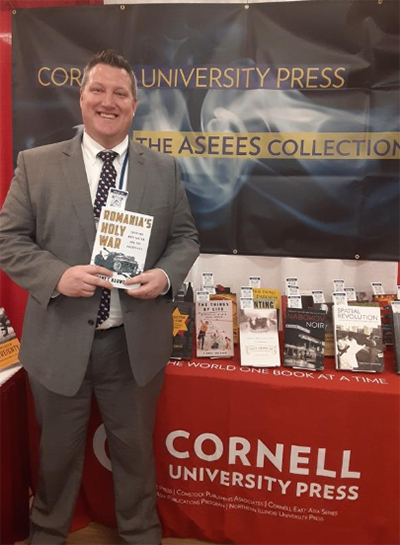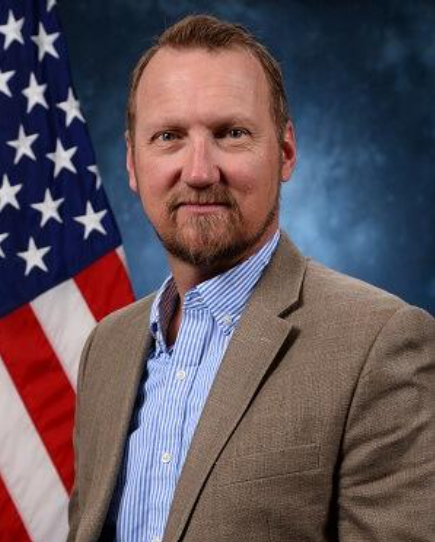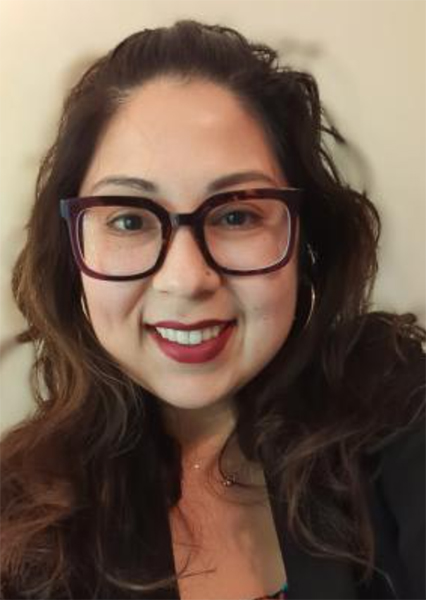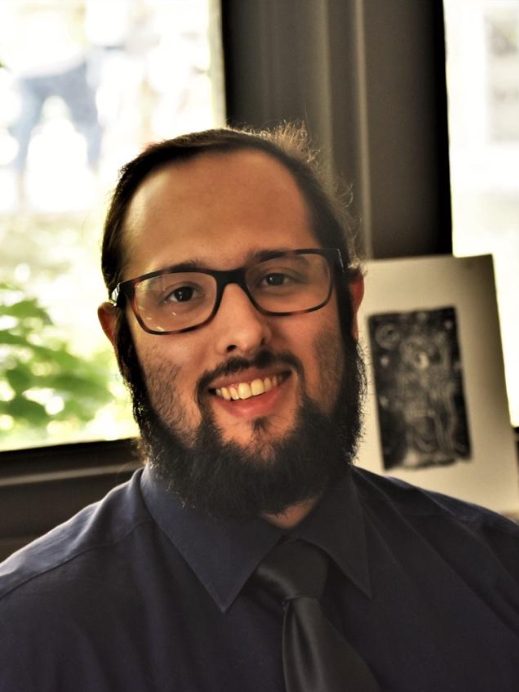History majors at Texas A&M have gone on to incredible professional success, from working in the Pentagon to winning a Pulitzer Prize. Many history majors enter careers in law, business, the military, government service, journalism, teaching, and museum work.
Meet some of our distinguished alumni!
Dr. Grant T. Harward, Historian at the US Center of Military History, class of 2018

Dr. Grant T. Harward graduated with his PhD from Texas A&M University in 2018 under the supervision of Dr. Roger Reese. During his studies, Grant received a Fulbright Student Scholarship to research in Romania between 2016 and 2017. Before, during, and after, his graduate studies, Grant published numerous articles in academic journals. He published his dissertation as a book titled Romania’s Holy War: Soldiers, Motivation, and the Holocaust, with Cornell University Press in 2021. In 2022, the Association for Slavic East European and Euro-Asian Studies awarded him the Barbara Jelavich Prize for best book on East European History. Between 2018 and 2021 Grant worked as a staff historian for the US Army Medical Department Center of History and Heritage in San Antonio, Texas between 2018 and 2021. There, he collaborated with curators and archivists on projects at the Army Medical Department Museum, wrote articles and encyclopedia entries on Army medical history and conducted oral history interviews. Since 2021, he has been a historian at the US Center of Military History in Washington, D.C. where he fields historical inquiries from the Headquarters of the Department of the Army, factchecks social media posts for the CMH, conducts oral history interviews, and write manuscripts on topics of interest to the leadership of the Department of the Army.
Mark E. Grotelueschen, Chief of Academic Administration in the Department of Military and Strategic Studies at the USAF Academy,class of 2003

Mark E. Grotelueschen, graduated with his PhD from Texas A&M in 2003 under the supervision of Dr. Brian Linn. He currently teaches a range of strategic studies courses and serves as the Chief of Academic Administration in the Department of Military and Strategic Studies at the USAF Academy near Colorado Springs, Colorado. He previously served as Professor of History and Director of Academics in the Department of History. During more than a decade of teaching at the Air Force Academy he has taught a wide variety of courses covering strategy, military thought, history, statesmanship, and area studies. He has previously served as the Chief of the Military History Division, the chair of the Academy’s African Area Studies Group, and a member of the Scholars Program Advisory Council. He is the recipient of the Outstanding Academy Educator Award, the McDermott Award for Research Excellence, and the Orrison Award for cadet advising and mentoring. A 27-year Air Force veteran; among his various assignments he commanded the 380th Expeditionary Maintenance Operations Squadron at Al Dhafra Air Base, UAE, in 2004-2005. Dr Grotelueschen also served as the Deputy Chief of Engagement Integration in the Strategy, Plans, and Programs Directorate in Ramstein, Germany. He deployed as a United Nations peacekeeper in the United Nations Mission in Liberia, where he helped plan and execute successful national elections in 2011. He is the author or editor of many articles and books, including The AEF Way of War: The American Army and Combat in World War I (Cambridge, 2007), which has been selected repeatedly by multiple US Army Chiefs of Staff for their Professional Reading Lists.
Dr. Tiffany González, Assistant Professor of History, University of Kansas, class of 2020.

Dr. Tiffany González graduated from Texas A&M in 2020 under the supervision of Dr. Sonia Hernandez. She currently is an Assistant Professor of History at the University of Kansas. Her research centers on 20th-century U.S., emphasizing U.S. politics, Chicana-Latina/o history, women’s history, and social movements. Her current book manuscript-in-progress, “Representation of Change: How Chicanas Reshaped the American Political Process in the Late Twentieth Century,” is under-contract with UNC Press with the Latinx Histories Series. Her forthcoming book examines how Chicanas fought for the ERA and self-determination, as well as for participation and representation in U.S. politics during the Chicana/o and Women’s Movement. This book is a revised version of her dissertation, which won the OAH Lerner-Scott Prize for best PhD dissertation in U.S. women’s history in 2022. Her second book project will center the life of former Texas State Representative Irma Rangel, the first Mexican American woman feminist legislator, who served in office from 1977 to 2003. Rangel is most remembered for her legislative activism on behalf of women and the working-class, as well as her stance on welfare reform, equity in higher education, and labor rights.
Dr. Ian Seavey: Studiousness and Softball: My Story of Graduate School

During the Spring semester of 2024, I achieved some major milestones in my life. In January, I defended my dissertation on disasters and U.S. colonialism in twentieth century Puerto Rico. Less than a month later, I accepted a tenure-track assistant professor position at the University of Texas-Rio Grande Valley. These achievements are the culmination of a six-year plan that I embarked upon in 2018 after arriving in College Station.
When I look back on my years as a graduate student in the history department at Texas A&M University, the first thing that comes to mind is “the timeline.” Think about where you want to be in 5-6 years and check the right boxes along the way to ensure that you achieve your goals. My wonderful advisor Jason Parker preached this to me early on and it has continued to stick in my brain. As a bright-eyed first year graduate student, I had made up my mind that I wanted to become a professor. However, the common refrain from most every faculty member was that “the job market is extremely difficult, and you should prepare for a career outside of academia.” Through countless conversations with my advisor and extremely helpful professional development workshops, I quickly came to understand that landing an academic job required a lot more than just a PhD. Even the tried-and-true trifecta of publishing, having teaching experience, and winning outside grants and fellowships seemed to be not enough anymore.
In the spring semester of my first year, I realized that yes, I need to publish, get teaching experience, and apply for outside grants and fellowships, but I also had to set myself apart in some way from the rest of the pack. I decided that for me to be competitive on the academic job market in 5-6 years, I needed to brand myself as wide as possible. I leaned, and continue to lean, into many different subfields of history and extend my research and teaching into other disciplines as well. Therefore, I enthusiastically embraced environmental history, the history of U.S. in the world, international relations, Latin American studies, military history, empire studies, critical disaster studies, and digital humanities. By casting my net extremely wide, I made connections with people both inside and outside academia that were extremely influential to my development as a historian.
In my 5th year, I chose to develop a digital humanities project to complement my dissertation research and broaden my scholarly profile. I worked with some undergraduate students from the geography department who taught me the ins and outs of ArcGIS Story Maps and created an interactive map that displayed every hurricane that hit Puerto Rico since 1899. Earlier that year, I had created a Twitter account purely for academic and professional purposes and after the digital humanities project was finished, I shared it on Twitter. I could have never anticipated the attention it received. Over 50,000 people engaged with the post, and I was contacted by Filantropía Puerto Rico, a prominent philanthropic organization on the island to present the project to their leadership and donors. Through this connection, I was able to achieve my goal of using my research to impact a more public-facing audience.
Lastly, throughout my years toiling away as a graduate student and worrying about publications, which conferences to attend, and which fellowships to apply for, I always tried to maintain a healthy work-life balance. My activities of choice were starting and managing a department softball team along with my colleague Jonathan Carroll and playing guitar in a heavy metal band. Early on in my graduate studies, I decided that if I had to sacrifice everything in my life to become an academic drone to get a tenure-track job, I was not interested. However, I can confidently say that these activities have helped me become a better scholar because of the mental break, camaraderie, and different creative energy they provided. I hope my story can empower and provide hope for anyone seeking academic employment in the current day and age.
